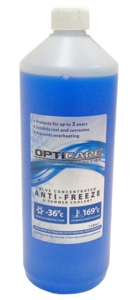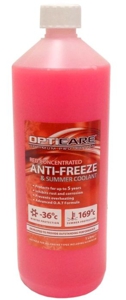
Antifreeze Explained: Choosing Between Blue and Red
Antifreeze is a critical fluid for both vehicles and plant machinery, safeguarding engines from freezing in cold temperatures and preventing overheating in warmer conditions. Whether you're dealing with a car or a piece of plant equipment, understanding the differences between "blue antifreeze" and "red antifreeze" is essential. In this blog post, we'll explore these differences and provide a guide for consumers to make informed decisions for both automotive and industrial applications.
Blue Antifreeze

- Formula:
Blue antifreeze is often associated with the traditional ethylene glycol formula. It contains corrosion inhibitors and additives designed to protect various metals and components within the cooling system, making it suitable for both vehicles and certain types of plant machinery.
- Applications:
Blue antifreeze is commonly used in older vehicles and some types of plant equipment, particularly those manufactured in the last few decades. It is compatible with copper and brass radiators, making it versatile for various industrial applications.
- Compatibility:
While effective, blue antifreeze is known to have limitations in terms of compatibility with certain modern cooling system materials, so it's important to check the specifications of your specific machinery.
Red Antifreeze

- Formula:
Red antifreeze is typically based on the extended-life organic acid technology (OAT) formula. It contains organic acids and additives for longer-lasting corrosion protection, making it a reliable choice for both automotive and industrial applications.
- Applications:
Red antifreeze is often recommended for newer vehicles and certain types of modern plant machinery, including those equipped with aluminum radiators and other advanced cooling system components. Its compatibility with a wider range of materials makes it suitable for the latest industrial equipment.
- Compatibility:
Red antifreeze is less likely to cause corrosion and is known for its compatibility with aluminum and other alloys, making it a preferred option for industries relying on the latest machinery materials.
Consumer Guide
- Check Your Vehicle or Machinery's Requirements:
Consult your vehicle's or machinery's manual to determine the recommended type of antifreeze. This information is crucial for ensuring optimal performance and longevity of your engine or equipment.
- Consider Your Climate:
Choose the antifreeze that suits the climate in your region, whether it's for your vehicle or plant machinery. Some formulations are designed for extreme cold, while others offer better heat dissipation in warmer conditions.
- Check Compatibility:
Ensure that the antifreeze you choose is compatible with the materials used in your vehicle's or machinery's cooling system. This is particularly important for modern equipment with advanced materials.
- Follow Mixing Guidelines:
If you need to top up your antifreeze, follow the manufacturer's guidelines regarding mixing different types. Some antifreeze formulations should not be mixed to maintain their effectiveness.
- Extended Life vs. Conventional:
Consider the maintenance schedule you're willing to adhere to for both your vehicle and plant machinery. Extended-life antifreeze may cost more upfront but could save you money and effort in the long run due to its longer service intervals.
- Oil Finder:
Discover the perfect antifreeze for your heavy plant machinery with our easy-to-use Oil Finder.
Conclusion
Choosing the right antifreeze for your vehicle or plant machinery is a crucial decision that can impact its performance and longevity. Understanding the differences between blue and red antifreeze, along with considering your vehicle's or machinery's requirements and climate, will help you make an informed choice. Always follow the manufacturer's recommendations and guidelines for proper use and maintenance of your engine or equipment's cooling system.